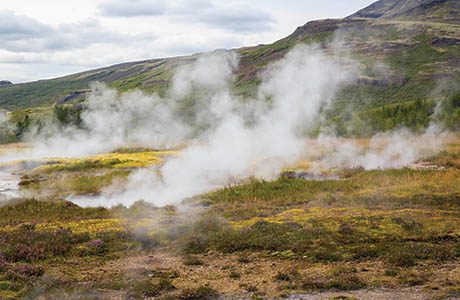Hot water from Scotland’s mines and rocks could offer new energy industry jobs and reduce fuel poverty. Recent funding and start-up announcements may signal the arrival of a new industry, but there are still barriers to overcome.
The Scottish Government is to provide a £250k fund to support research into exploring the nation’s geothermal energy resource. Announcing the Geothermal Energy Challenge Fund in early March, Fergus Ewing, Minister for Business, Energy and Tourism, said: “Over the last few years we have developed a better understanding and appreciation of the geothermal resource under our feet. Scotland already has two successful small-scale housing projects in Glenalmond Street, Shettleston, and Lumphinnans, Fife, which use water from disused mines to provide the heat for members of the local community.
“I have taken the advice of the Geothermal Energy Expert Group to build on the findings of the study undertaken in 2012-13 by supporting exploration of the significant potential for geothermal energy in naturally occurring groundwater and the water collecting in our abandoned mines.

“Now is the time to take the experience of the housing projects in Shettleston and Fife and take the first steps towards the development of a delivery model which reduces carbon emissions, is self-sustaining and is economically viable.”
In Scotland, 55% of the nation’s energy demand is for heat. Currently most of this heat comes from fossil fuels.
A Scottish Government report in 2013 indicated that a third of ScotlandAs entire heating needs could be provided from the heat within water-filled disused mines, which number in the hundreds. The extraction process involves drilling wells to bring the water to the surface. Heat is taken from this water and distributed to local communities through a district heating scheme.
In the UK, one of the most high profile players in this emerging sector has been GT Energy, which is currently developing a geothermal scheme to service homes in Manchester.
Describing itself as “Scotland’s first geothermal energy company”, Edinburgh-based start-up Town Rock Energy hopes to make important gains in this direction.
The firm is being supported in its early stages through the capital’s Interspace network of business incubators, and is one of the founding members of the Edinburgh Centre for Carbon Innovation’s Low Carbon Ideas Lab, Edinburgh’s only low carbon focused business incubator.
Geothermal energy uses the same skillsets and the same technology as the oil and gas industry, says the firm, so it would make absolute sense for oil and gas companies to be exploring for geothermal energy. However, they’re not, said Town Rock Energy founder and managing director David Townsend.
The 24-year-old geology graduate from the University of St Andrews has set up the company with his father Phil, who has experience in exploration geology and North Sea oil field management. He believes Scotland’s natural geothermal resource addresses the energy trilemma: the search for affordable, low-carbon energy that doesn’t rely on imported fuel.
“Our vision is to see the geothermal resources that Scotland is blessed with used as an integral part of the future energy mix, positioning Scotland as a global leader in carbon neutrality,” said Townsend.
Legislative and planning changes needed
Commenting on the barriers to developing this industry in Scotland, Townsend said: “The legislative and planning permission framework needs to be adapted effectively. So there are huge obstacles to overcome. But once the first couple of projects are established and successfully heating customers, I think we’ll start to see these systems rolled out all over the country.”
The opportunity is timely, he suggests. For one thing, the low oil price creates more skilled people looking for jobs in the sector and reduces the cost of drilling, which in turn reduces the cost of exploring for geothermal energy. The UK government has also named this the decade of renewable heat, with incentives on offer to install and expand district heating schemes.
Townsend sits on the Scottish Government’s Geothermal Energy Expert Group and is based at the Edinburgh Centre for Carbon Innovation (ECCI) Low Carbon Ideas Lab. Town Rock Energy will be pitching for funding to grow its team and design a number of conceptual systems at two upcoming investor showcases, Engage Invest Exploit in Edinburgh this May and the Cleantech Innovate event in Glasgow this June.
Commenting on the Scottish Government’s latest funding announcement, Friends of the Earth’s Richard Dixon said: “We already know that there is potential to deploy geothermal energy on a very wide scale in Scotland This new funding is very welcome and will help good proposals get moving and attract further investment. Different techniques will have different impacts but geothermal energy is clearly worth serious investigation, and it is great that the Scottish Government is taking the lead in making this happen.”
Iain Todd, chairman of Fife Geothermal, said: “This is an extremely encouraging step forward for a sector that offers significant potential for helping Scotland to achieve its sustainable energy ambitions, but in which there has been little commercial development to date.
“Fife is already recognised as having significant geothermal resources – both in terms of its geology and using hot water from former mine workings. Fife Geothermal is keen to promote and develop the region as a major strategic area for demonstrator sites in these technologies. Development of such sites in Fife would not only be underpinned by considerable local geological and mining expertise (both academic and industrial), but could prove a commercial source of sustainable energy feeding into Fife Council’s plans for public heating schemes in the area.”
Fife Geothermal is a consortium group that was established in May, 2014, as a strategic, catalytic tool for developing the region’s natural sources of geothermal energy.







